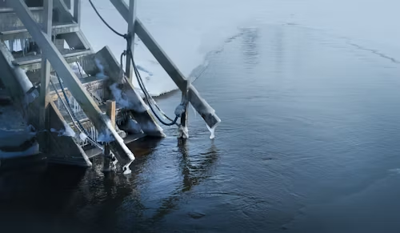Cold water swimming is an exercise that is known for its potential health benefits. While it may seem intimidating at first, the rewards make it worthwhile. Since 2007, the "Lake Monsters" of Open Water Chicago (OWC) have been taking weekly dips in Lake Michigan – even during winter.
Winter swimming requires careful planning and preparation. To safely brave the icy waters of Lake Michigan Steve Hernan, founder of the “Lake Monsters” at Open Water Chicago (OWC), has created a detailed guide on the OWC website. With over 15 years of experience, he provides essential advice for beginners embarking on this journey.
To participate, individuals must email Hernan directly. No information is made public, as swimming in icy waters carries serious risks with potentially dangerous consequences.
Hernan stresses that this is not a “polar bear plunge” or a bucket list activity. “This isn’t a ‘get in, get out’ photo op followed by hot cocoa,” he says. “We are dedicated year-round swimmers, and you won’t find support tents, lockers, changing rooms, hot showers, or gear rentals at any of our meetups.
“If that’s what you’re expecting, or if you're unwilling to use basic common sense, don’t come to our meetups. At best, you’ll embarrass yourself and be asked to leave. At worst, you’ll put your health and safety in danger and potentially ruin the experience for others,” Hernan advises. Preparation is crucial, and neglecting it can have serious consequences.
Cold plunging isn’t just a physical challenge, it’s a mental one as well. The psychological strength required is just as vital. Overcoming the battle of mind over matter could be the difference between life and death. Mental resilience is as essential as physical gear. Resilience may be the best thing to pack as you prepare.
To ensure readiness, pre-swim challenges can help test one’s resolve and build the mental toughness required. Getting your body used to cold-induced thermogenesis (producing heat through cold exposure) can help prepare for these challenges.
With the initial plunge, the sympathetic nervous system kicks in, giving you an adrenaline rush and making you feel more alert. But after that initial shock, the body goes through cold-induced vasodilation (blood vessel expansion), improving circulation and helping with recovery.
Cold shock proteins are then triggered in response to the frigid temperature. These proteins are activated to protect and repair cells that aid in recovery. If cold showers seem unbearable, cold-water immersion may not be the right fit for those looking to satisfy their adventurous spirits.
There are a few things to consider before joining the "Monsters" in Lake Michigan. Freshwater offers less buoyancy than salt water, making it harder to float. The lake currents and riptides can sometimes be stronger than those at sea beaches, so it's important to recognize the signs. If a rescue is needed due to failure to follow instructions, the individual may be required to reimburse the city, as their actions put rescue personnel at risk.
Cold water immersion offers some great benefits, but it requires proper preparation and an understanding of the risks. It can help with fatigue recovery, reduce inflammation, and even boost your mood, perfect for improving both mental and physical health.
The Open Water Chicago group proves that with the right mindset and readiness, embracing this challenging practice may lead to rewarding physical and mental gains.








(0) comments
Welcome to the discussion.
Log In
Keep it Clean. Please avoid obscene, vulgar, lewd, racist or sexually-oriented language.
PLEASE TURN OFF YOUR CAPS LOCK.
Don't Threaten. Threats of harming another person will not be tolerated.
Be Truthful. Don't knowingly lie about anyone or anything.
Be Nice. No racism, sexism or any sort of -ism that is degrading to another person.
Be Proactive. Use the 'Report' link on each comment to let us know of abusive posts.
Share with Us. We'd love to hear eyewitness accounts, the history behind an article.